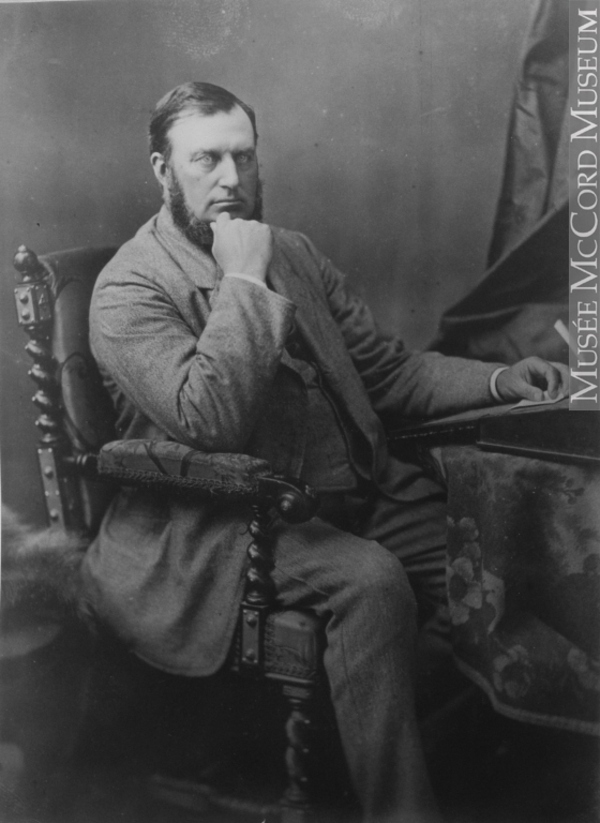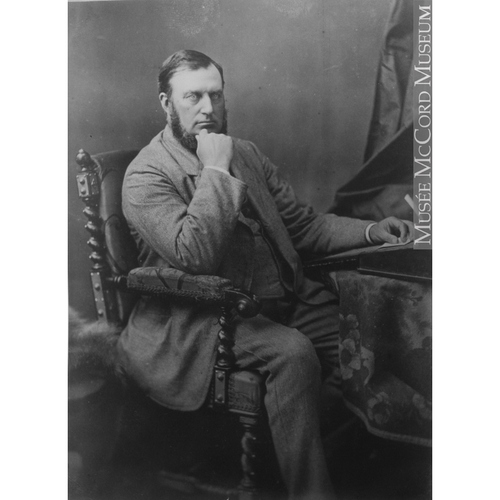
Source: Link
DUDER, EDWIN, merchant and shipowner; b. c. 1822 at St Mary Church, Devon, England, youngest of the nine children of Thomas Duder and Ann Congdon; m. first Mary Elizabeth Edgar, and they had one son, Edwin John; m. secondly Ann Blackler, and they had two daughters and one son, Arthur; d. 20 Feb. 1881 at St John’s, Nfld.
Edwin Duder’s family immigrated to Newfoundland in 1833 and, through enterprise and marriage, established itself in the commercial, social, and political life of the colony for the remainder of the century. The family’s arrival in St John’s coincided with the rapid decline in the outports of many of the old English-based mercantile establishments such as the Slade family firm, and their replacement by St John’s–based entrepreneurs, well placed to seize emerging opportunities. The career of Edwin Duder is a signal illustration of the process.
At St John’s, Edwin Duder established an import-export business which had, by the mid 1850s, spread along the northeast coast of the island to settlements such as Greenspond, Joe Batt’s Arm, Herring Neck, Change Island, Barred Islands, and Twillingate, centres of the inshore and Labrador fisheries and sealing. At these and other settlements, Duder owned extensive premises, supplied the fishermen in exchange for their catch, and owned and managed about 4,500 tons of shipping for the period from 1840 to 1889, being second only to Punton and Munn [see John Munn*] of Harbour Grace.
Throughout the same period, Duder’s fleet (excluding boats and skiffs) consisted of a maximum of 100 sailing ships in any one year. They were, for the most part, Newfoundland-built schooners engaged in the fisheries and coastal trade. He also owned a small number of foreign-going brigs and brigantines, not more than half a dozen vessels, possibly supplemented by chartered bottoms; with these he engaged in the export of salt fish to the West Indies, Brazil, Great Britain, and continental Europe. Although he seems not to have prosecuted the seal-fishery on a large scale, Duder was advantageously placed to reap the harvest of the inshore hunt through his dense network of northeast coast establishments. In the spring of 1862 he and his associate James Landers Muir received a windfall of £25,000 from the catch by landsmen.
Muir was in partnership with Duder from about 1858 to 1865. In 1871 Edwin Duder Jr entered his father’s firm and its name was subsequently amended to Edwin Duder and Sons. Edwin Sr died in 1881. “Not slothful in Business, Fervent in Spirit – serving the Lord,” reads the inscription on the memorial plaque to him in St Peter’s Anglican Church at Twillingate; and it describes him as “a merchant of this place.” He was a merchant of many places in Newfoundland, but above all a merchant of St John’s.
The end of Duder’s business empire came not long after his death, and it was the subject of a thoughtful analysis by the prime minister of Newfoundland, William Vallance Whiteway*, in the House of Assembly on 11 May 1897. Speaking to the general economic problems of the decade, he used two once-great firms, those of Duder and Munn, to illustrate the shattering impact of the failure of the Commercial Bank in 1894. The common pattern he sketched in his speech was the division of an estate on the death of the principal, which left the business without adequate capital. Edwin Duder had made several large bequests to family, church, and charitable organizations; the business was divided between his two sons. Arthur died within a year of Edwin Sr, and Edwin John, the surviving partner, was obliged to pay half the value of the family firm in cash to his brother’s widow. The great Duder enterprise continued during the recession of the 1880s, but it did so without adequate capital. When the Commercial Bank crashed, Edwin John, who had begun business in 1882 with a capital stock of $128,000, owed it $668,600 on current account alone. On 24 May 1895 the Duder northeast coast premises, upon which the meteoric rise of the enterprise had been based, were sold by the creditors.
A Duder genealogical tree is in the possession of Janet Story (St John’s). Maritime Hist. Group Arch., Board of Trade, ser. 107–8; Duder name file. PANL, Duder colt. Evening Telegram (St John’s), 21, 22 Feb. 1881; 2 May, 1, 2 June 1897. Newfoundlander, 28 March 1879. Royal Gazette (St John’s), 31 Aug. 1835; 17 Aug. 1852; 22 Feb., 27 Dec. 1881. Twillingate Sun (Twillingate, Nfld.), 17 March 1881. Business and general directory of Nfld., 1877: 9. Family names of the island of Newfoundland, comp. E. R. Seary and S. M. P. Lynch (St John’s, 1976). H. Y. Mott, Newfoundland men, a collection of biographical sketches (Concord, N.H., 1894). Notable events in the history of Newfoundland; six thousand dates of historical and social happenings, comp. P. K. Devine and J. O’Mara (St John’s, 1900), 39, 156. A “who was who” of families engaged in the fishery and settlement of Newfoundland, 1660–1840, comp. Keith Matthews (St John’s, 1971). Book of Nfld. (Smallwood), V: 561. [E. M. Manuel], St. Peter’s Anglican Church, Twillingate, one hundred and twenty-five year history, 1845–1970 . . . (n.p., 1970?), 12–13, 36. Prowse, Hist. of Nfld. (1895), 491–92. G. M. Story, George Street Church, 1873–1973 (St John’s, 1973).
Cite This Article
G. M. Story, “DUDER, EDWIN,” in Dictionary of Canadian Biography, vol. 11, University of Toronto/Université Laval, 2003–, accessed February 21, 2026, https://www.biographi.ca/en/bio/duder_edwin_11E.html.
The citation above shows the format for footnotes and endnotes according to the Chicago manual of style (16th edition). Information to be used in other citation formats:
| Permalink: | https://www.biographi.ca/en/bio/duder_edwin_11E.html |
| Author of Article: | G. M. Story |
| Title of Article: | DUDER, EDWIN |
| Publication Name: | Dictionary of Canadian Biography, vol. 11 |
| Publisher: | University of Toronto/Université Laval |
| Year of publication: | 1982 |
| Year of revision: | 1982 |
| Access Date: | February 21, 2026 |



